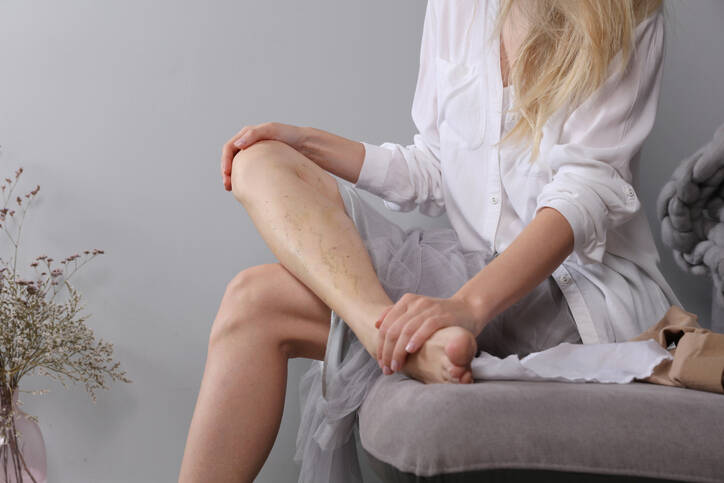- wikiskripta.eu - swelling, edema
- angiocare.sk - Swelling of the legs during travel
- swollenfoot.sk - Exercises to avoid swollen feet
Leg swelling in young women or in pregnancy. What can be the causes?

Swelling of the lower limbs is to some extent natural and does not pose a serious problem. However, there are situations when it is necessary to be alert.
Article content
Swelling of the feet does not only affect us in old age or as a result of a certain disease. In pregnancy, after childbirth, surgery or injury, it is quite common in young and otherwise healthy women. And not only then.
Whether it is swelling of one leg, both legs, ankle or calf, the causes can be different. Let's take a closer look at them.
As a result of swelling, there may be a disturbance in the exchange of water and nutrients between the blood and cells.
Cause of leg swelling
Swelling (edema) is actually the accumulation of fluid in the intercellular space. The causes can be divided into local and general.
For local or site-specific swelling, for example, it is the result of injury or inflammation.
Total or systemic causes include heart failure or kidney failure.
Swelling of the legs is especially accentuated in summer and in warm environments. The reason for this is the heat. It dilates the blood vessels and thus slows down the blood flow. In addition, the risk of dehydration also increases.
Painful, heavy and swollen feet
The feeling of heavy legs, swelling or pain is becoming more and more common even in the young population. Basically, gravity is the culprit. However, this should be easily overcome by the body. The reasons why this is not the case are varied.
On the contrary, they occur quite often. It is mainly due to our way of life today. Read our article.
Factors negatively influencing the development of swelling and pain in the feet:
- Overweight
- sedentary lifestyle
- lack of exercise
- inappropriate diet
- Stress
Pain and swelling in the legs usually indicate problems with the venous system and blood return. There is a loss of elasticity and weakening of the venous wall. Blood builds up in the veins, impaired blood flow and swelling occurs.
Skin discolouration, visible varicose veins or so-called scourges should not be regarded as an aesthetic problem. Read more about chronic venous disease and venous insufficiency.
Long periods of standing and sitting
Swelling of the lower limbs after prolonged standing or sitting is to some extent considered natural. It occurs spontaneously and does not pose a serious risk. The cause of such swelling is a slowing of venous flow from the lower limbs back to the heart.
It occurs especially during prolonged travel, when the pump in the calf muscle does not work during long periods of sitting. This means that the calf muscles do not work when sitting or standing in one place. This slows down venous return and blood accumulates in the lower limbs.
A factor that further aggravates this return of blood from the lower limbs is heat. In a warm environment, such as in summer, blood vessels naturally dilate to help cool the body. However, in such blood vessels, the flow of blood through the vessels slows down and blood builds up at the same time.
These swellings should subside within a few days. If they continue to persist, they may be a manifestation of other diseases of the veins or lymphatic system. Read also about lymphoedema.
A serious disease that is related to lower leg swelling and travel is venous thrombosis. It is a painful disease with a high risk of other health complications. You should be especially alert if you observe pain and swelling in only one leg.
Read about it in the article.
How to prevent leg swelling and watering in pregnancy
Swelling, heavy legs and varicose veins are more common in the female sex than in the male sex. Hormonal changes, frequent wearing of high shoes, tight clothing and, of course, pregnancy or menopause contribute to this.
During pregnancy, swelling of the feet occurs in up to 75% of women. This is associated with increased water retention in the body as well as difficulty in returning blood.
This aesthetic problem is particularly troubling for women. Why?
What are the reasons for the swelling in the third trimester of pregnancy?
The size of the fetus and the uterus, which oppresses the inferior vena cava, contributes to these swellings. Through this vein, blood flows from the lower body to the heart. The pressure of the enlarging baby reduces this flow. Blood accumulates especially in the lower limbs, resulting in swelling.
Swelling in the early months of pregnancy?
Swelling can occur as early as early pregnancy. Such swelling is most often caused by fluid retention in the body and an increase in the total volume of fluid in the body, which is natural and harmless during pregnancy. It is caused by increased production of antidiuretic hormone, which affects kidney function.
Swelling in pre-eclampsia
Swelling that may indicate a certain risk is swelling caused by pre-eclampsia. You may suspect this disease, especially if you notice swelling not only on the lower limbs, but also on the hands or face.
This is pregnancy-induced high blood pressure with the presence of protein in the urine and swelling.
For a pregnant woman, pre-eclampsia poses a threat to the kidneys, liver and nervous system. The fetus is in turn at risk from a reduced supply of oxygen and nutrients via the umbilical cord.
Learn more about the risks of pre-eclampsia and its symptoms in pregnancy.
A large number of problems and inconveniences can occur during pregnancy. Some are natural and do not pose a serious problem. Others pose a potential risk to both mother and fetus.
The best way to prevent many complications and problems is in the period before pregnancy. This includes a good diet, sufficient nutrition and keeping fit. During pregnancy, a complete ban on smoking and alcohol is a matter of course.
You may also be interested in the article.
Swelling after childbirth and caesarean section
There are women who have experienced leg swelling after childbirth. The reason is that during childbirth, protein is lost at an increased rate and fluid leaks out of the blood into the tissues.
Allow yourself plenty of rest and a diet rich in protein. The swelling should go away with time. However, if it persists for more than a week, see your gynaecologist.
Breastfeeding mothers in particular should indulge in plenty of protein, calcium and whole grain products after giving birth.
The table lists some foods with higher protein content
| Eggs | 13 g/100 g |
| beef | 36 g/100 g |
| chicken and turkey meat | 30 g/100 g |
| salmon | 25,5 g/100 g |
| tuna | 26 g/100 g |
| milk | 6 g/100 g |
| nuts and seeds | 33 g/100 g |
Swelling of one limb
In the case of swelling of only one limb, it is usually a local problem. It is most often the result of inflammation, injury or venous disease. It is often accompanied by pain and redness.
Swelling in injury
Swelling often accompanies various injuries. In them, the integrity of various structures is disrupted, depending on the type of injury.
In bruising, bleeding occurs into the subcutaneous tissue or tissue. In sprain, dislocation or even fracture, besides bleeding, there is also injury to muscles, ligaments and other soft structures.
All these injuries are characterised by pain, impaired mobility and swelling. A bruise - haematoma - may result.
Both the swelling and the resulting inflammation have their own rationale and significance. The swelling acts partly to immobilise the injured limb, while the inflammation accelerates the healing process.
Read more about lower limb injuries in the article .
How to avoid unnecessary leg swelling?
An active lifestyle brings with it the prevention of many diseases. Regular physical activity is also essential in the fight against swollen feet. The most effective activities are those that promote blood flow in the body. Examples are walking, running, swimming, cycling and dancing.
On the other hand, be careful with strength sports such as weight training or heavy lifting. These activities can put strain on blood vessels and valves.
When travelling, take sufficient breaks. Try to move your legs and stretch your calf muscles. Do not sit cross-legged. This makes it very difficult for blood to circulate through your legs. If possible, put them up.
Tightening stockings can also be a good preventive measure. Ask your doctor or pharmacy for advice on their selection.
Don't forget to drink enough. Especially in summer, more fluid is lost from the body than you think.
Read our interesting magazine article.
Avoid long periods of standing, sitting and stress. Avoid salt, alcohol and a varied and balanced diet.
Don't overdo it with the salt. Salt retains fluids in the body. Try to take in enough fluids. Because sufficient hydration helps your body get rid of excess fluids.
Prefer loose clothing and comfortable shoes. At least give yourself light exercise or regular walks.
When lying down during pregnancy, prefer especially the position on the left side. In this position, the fetus does not press on the inferior vena cava and does not impede the flow of blood from the lower limbs.
Interesting resources










